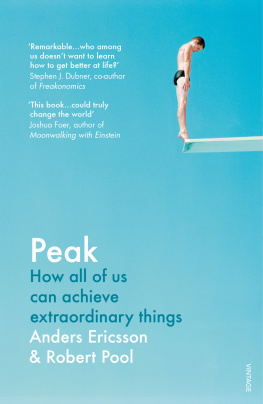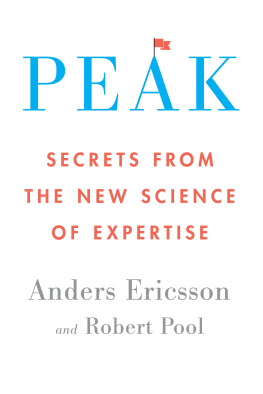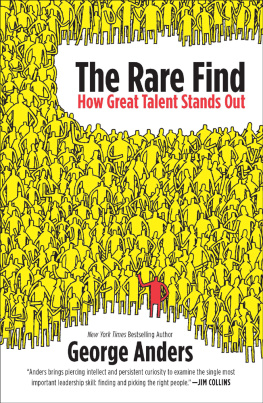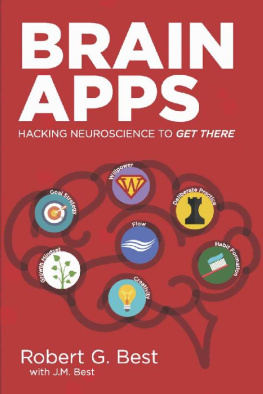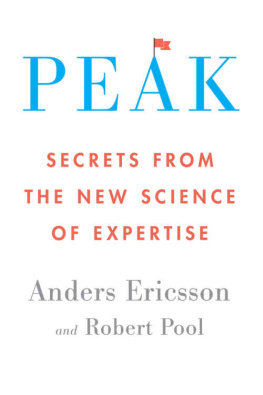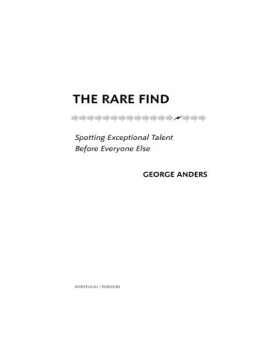Contents
To my wife, Natalie, for facilitating and encouraging my efforts to keep pushing beyond my current level of understanding of expert performance and getting closer to the peak.
A. E.
To my soul mate and my muse, Deanne,
who taught me
much of what I know about writing,
most of what I know about living,
and all of what I know about love.
R. P.
Introduction:
The Gift
WHY ARE SOME people so amazingly good at what they do? Anywhere you look, from competitive sports and musical performance to science, medicine, and business, there always seem to be a few exceptional sorts who dazzle us with what they can do and how well they do it. And when we are confronted with such an exceptional person, we naturally tend to conclude that this person was born with something a little extra. He is so gifted, we say, or, She has a real gift.
But is that really so? For more than thirty years I have studied these people, the special ones who stand out as experts in their fields athletes, musicians, chess players, doctors, salespeople, teachers, and more. I have delved into the nuts and bolts of what they do and how they do it. I have observed, interviewed, and tested them. I have explored the psychology, the physiology, and the neuroanatomy of these extraordinary people. And over time Ive come to understand that, yes, these people do have an extraordinary gift, which lies at the heart of their capabilities. But it is not the gift that people usually assume it to be, and it is even more powerful than we imagine. Most importantly, it is a gift that every one of us is born with and can, with the right approach, take advantage of.
THE LESSON OF PERFECT PITCH
The year is 1763, and a young Wolfgang Amadeus Mozart is about to embark on a tour around Europe that will jump-start the Mozart legend. Just seven years old and barely tall enough to see over the top of a harpsichord, he captivates audiences in his hometown of Salzburg with his skill on the violin and various keyboard instruments. He plays with a facility that seems impossible to believe in someone so young. But Mozart has another trick up his sleeve that is, if anything, even more surprising to the people of his era. We know about this talent because it was described in a rather breathless letter to the editor about the young Mozart that was published in a newspaper in Augsburg, Mozarts fathers hometown, shortly before Mozart and his family left Salzburg for their tour.
The letter writer reported that when the young Mozart heard a note played on a musical instrument any note he could immediately identify exactly which note it was: the A-sharp in the second octave above middle C, perhaps, or the E-flat below middle C. Mozart could do this even if he was in another room and could not see the instrument being played, and he could do it not just for the violin and fortepiano but for every instrument he heard and Mozarts father, as a composer and music teacher, had nearly every imaginable musical instrument in his house. Nor was it just musical instruments. The boy could identify the notes produced by anything that was sufficiently musical the chime of a clock, the toll of a bell, the ah-choo of a sneeze. It was an ability that most adult musicians of the time, even the most experienced, could not match, and it seemed, even more than Mozarts skill on keyboard and violin, to be an example of the mysterious gifts that this young prodigy had been born with.
That ability is not quite so mysterious to us today, of course. We know a good deal more about it now than 250 years ago, and most people today have at least heard of it. The technical term is absolute pitch, although it is better known as perfect pitch, and it is exceptionally rare only about one in every ten thousand people has it. It is much less rare among world-class musicians than among the rest of us, but even among virtuosos it is far from normal: Beethoven is thought to have had it; Brahms did not. Vladimir Horowitz had it; Igor Stravinsky did not. Frank Sinatra had it; Miles Davis did not.
It would seem, in short, to be a perfect example of an innate talent that a few lucky people are born with and most are not. Indeed, this is what was widely believed for at least two hundred years. But over the past few decades a very different understanding of perfect pitch has emerged, one that points to an equally different vision of the sorts of gifts that life has to offer.
The first hint emerged with the observation that the only people who had received this gift had also received some sort of musical training early in their childhood. In particular, a good deal of research has shown that nearly everyone with perfect pitch began musical training at a very young age generally around three to five years old. But if perfect pitch is an innate ability, something that you are either born with or not, then it shouldnt make any difference whether you receive music training as a child. All that should matter is that you get enough musical training at any time in your life to learn the names of the notes.
The next clue appeared when researchers noticed that perfect pitch is much more common among people who speak a tonal language, such as Mandarin, Vietnamese, and several other Asian tongues, in which the meaning of words is dependent on their pitch. If perfect pitch is indeed a genetic gift, then the only way that the tonal-language connection would make sense would be if people of Asian ancestry are more likely to have genes for perfect pitch than people whose ancestors came from elsewhere, such as Europe or Africa. But that is something that is easy to test for. You just recruit a number of people of Asian ancestry who grew up speaking English or some other nontonal language and see if they are more likely to have perfect pitch. That research has been done, and it turns out that people of Asian heritage who dont grow up speaking a tonal language are no more likely than people of other ethnicities to have perfect pitch. So its not the Asian genetic heritage but rather learning a tonal language that makes having perfect pitch more likely.
Up until a few years ago, this was pretty much what we knew: Studying music as a child was thought to be essential to having perfect pitch, and growing up speaking a tonal language increased your odds of having perfect pitch. Scientists could not say with certainty whether perfect pitch was an innate talent, but they knew that if it was a gift, it was a gift that only appeared among those people who had received some training in pitch in childhood. In other words, it would have to be some sort of use it or lose it gift. Even the lucky few people who are born with a gift for perfect pitch would have to do something in particular, some sort of musical training while young to develop it.
We now know that this isnt the case, either. The true character of perfect pitch was revealed in 2014, thanks to a beautiful experiment carried out at the Ichionkai Music School in Tokyo and reported in the scientific journal Psychology of Music.
This is an astonishing result. While in normal circumstances only one in every ten thousand people develops perfect pitch, every single one of Sakakibaras students did. The clear implication is that perfect pitch, far from being a gift bestowed upon only a lucky few, is an ability that pretty much anyone can develop with the right exposure and training. The study has completely rewritten our understanding of perfect pitch.

